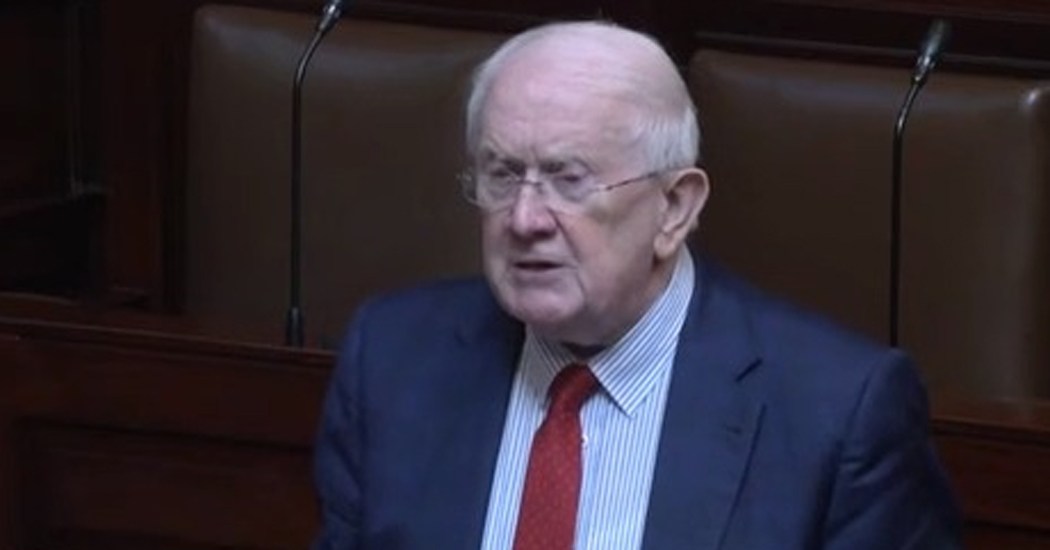Deputy Pat the Cope Gallagher TD has warned that Ireland is facing the worst crisis in the history of its fishing and processing sector, describing the situation as “a real Economic Armageddon” for coastal communities and the wider marine economy.
Speaking during his statement in the Dáil on Wednesday, 22 October, in the presence of the Marine Minister Timmy Dooley TD, the Minister for Agriculture, Food and the Marine Martin Heydon TD, and other members of Government, Deputy Gallagher said that unless drastic action is taken in the coming weeks, Ireland will experience “the most devastating fallout since the foundation of the State.”
“Over the past five years, Norway, Iceland and the Faroe Islands have overfished mackerel by one million tonnes. In some years, Norway alone has overfished by 55%. These are the same countries calling for sustainable fishing — yet it is Ireland that faces devastating quota cuts,” he said.
Deputy Gallagher said the roots of the current crisis go back to the Brexit negotiations, when Ireland made disproportionate sacrifices to secure the wider EU deal.
“The fishing industry was thrown under the bus to secure Brexit,” he said.
“Had Ireland threatened to veto the Brexit deal, we would not have this problem today. We would have had a dispute with Europe — but we would still have the mackerel we gave away to secure Brexit. Our fishermen and processors have paid the heaviest price for political expediency.”
He warned that the catching, processing, and ancillary service sectors will all be severely hit.
Deputy Gallagher said the scale of the proposed pelagic and demersal quota cuts for 2026 is unprecedented and threatens to dismantle Ireland’s fishing industry. The number of whitefish stocks now at zero-catch limits is unprecedented in scale.
The pelagic sector — covering mackerel, blue whiting, and boarfish — faces reductions of 70%, 41%, and 22%, while demersal species such as cod, haddock, and whiting in the Celtic Sea face zero-catch advice.
“This is the biggest cut in fishing opportunities in our history,” he said. “The pelagic and demersal fleets alike are staring at ruin. These proposals will wipe out the economic base of many coastal towns.”
Industry analysis shows a likely €130 million fall in quota value, with the pelagic fleet losing around 36% of its fishing opportunities. The processing sector could contract by €180–200 million within 12 months, with up to 2,400 jobs affected across the seafood economy.
“We are facing the loss of up to 50% of our national quota value,” Deputy Gallagher warned. “Factories are already preparing to close, and rural communities in Donegal, Cork, Galway, and Kerry will be devastated.”
Deputy Gallagher said Ireland must immediately invoke all Hague Preference entitlements at the upcoming December Fisheries Council.
“The Hague Preferences must be invoked in full,” he said. “They were designed to protect countries like Ireland that depend heavily on fishing. Applying them is essential to defend our national interests and protect thousands of livelihoods.”
Deputy Gallagher called on the Government to activate Regulation (EU) No. 1026/2012, which allows for market-access and trade restrictions against third countries engaged in unsustainable overfishing, and to invoke all Hague Preference entitlements at the December Fisheries Council.
“Norway is the chief architect of the destruction of the mackerel stock and must be denied access to Irish waters,” he said. “Ireland and the EU must deliver a strongly united no to Norway and ensure trade measures are fully applied.”
He urged the Marine Minister Timmy Dooley TD, together with the Tánaiste and Minister for Foreign Affairs Simon Harris TD, to lead an urgent diplomatic and political offensive to protect Ireland’s interests.
“All EU Ambassadors should be summoned and briefed on the severe implications for Ireland,” he said. “They must inform their Ministers and secure support at the upcoming Council of Fisheries Ministers meetings in December.”
Deputy Gallagher said long-standing weaknesses within the Department of Marine and excessive SFPA regulation are undermining Ireland’s competitiveness and driving foreign landings away.
He called for a redraft of the Sea-Fisheries and Maritime Jurisdiction Act 2006, the re-introduction of in-factory weighing, and an all-of-government approach to protect the sector.
“The Department must strengthen its representation in Brussels and fully back our fishing communities,” he said. “If we fail to act now, we will pay the greatest price due to our own incompetence.”
Pat the Cope heralds ‘economic Armageddon’ for fishing was last modified: October 23rd, 2025 by Rachel McLaughlin
Tags:
